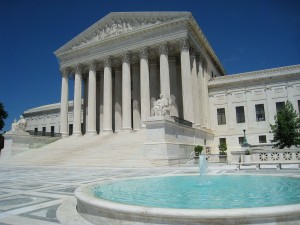Federal Crime Lawyer: Protecting Your Legal Rights Versus Serious Federal Charges
Federal Crime Lawyer: Protecting Your Legal Rights Versus Serious Federal Charges
Blog Article
Demystifying the Process of Federal Appeals: What You Need to Know
Navigating the complex world of government appeals can frequently appear like going across undiscovered waters for those not familiar with the procedure. Understanding the nuances of appellate court jurisdiction, the ins and outs of submitting a notification of allure, offering an engaging short, and making a persuasive oral debate are important components that can substantially impact the end result of a situation. By unwinding the layers of complexity bordering government allures, individuals can acquire a more clear insight into the mechanisms that govern this important phase of the lawful system.
Comprehending Federal Appeals Process
Exploring the elaborate realm of the federal allures procedure reveals a structured and methodical trip through the judicial system. Federal allures work as an essential mechanism for evaluating choices made by reduced courts. Recognizing this procedure is necessary for anyone associated with lawful procedures at the federal level.
The procedure normally begins with a party disappointed with a lower court's ruling filing a notice of allure. This activates an evaluation by a higher court, where a panel of courts evaluates the legal debates provided by both parties. Briefs laying out the legal thinking behind each party's placement are sent, and oral debates may be heard to make clear complicated issues.
The appellate court's choice is based on an extensive assessment of the lower court's process and the arguments presented. The judges do not reexamine facts but focus on whether legal errors happened that impacted the lower court's decision. Once the appellate court reaches a decision, it can affirm, reverse, remand, or modify the reduced court's judgment, giving quality and finality to the lawful disagreement. Recognizing this procedure is vital for navigating the complexities of government charms successfully.
Appellate Court Territory Described
As we advance from understanding the government charms process to dissecting the complexities of appellate court jurisdiction, a basic facet comes to light pertaining to the authority and restrictions of these higher courts in the legal landscape. Appellate court jurisdiction describes the scope of instances that a specific appellate court has the power to review and determine upon. Unlike trial courts that hear situations for the very first time, appellate courts are limited to examining choices made by lower courts. These choices can consist of judgments from both state and government courts.
Appellate courts have jurisdiction over specific types of instances, generally those including legal mistakes, procedural problems, or questions of regulation instead of valid disagreements. The jurisdiction of appellate courts is usually outlined in statutes and legislations that control the court system. Recognizing appellate court jurisdiction is important for celebrations associated with the allures process as it figures out whether an instance is eligible for review and the extent to which the appellate court can interfere in the reduced court's decision.
Declaring a Notification of Appeal
The preliminary action in starting the government allures procedure entails filing a Notification of Appeal with the appropriate appellate court. This vital record officially notifies the court and the other parties associated with the situation that the appealing party intends to look for an evaluation of the reduced court's decision. Filing a Notice of Charm is a rigorous step-by-step need that establishes the appellate procedure moving.
When preparing the Notice of Charm, it is vital to make check my reference certain compliance with the details regulations and standards of the appropriate appellate court. federal crime attorney. The file must typically include info such as the situation name, the lower court's name, the day of the judgment being appealed, and a concise declaration suggesting the grounds for the appeal

Rundown and Dental Argument
In the appellate procedure, presenting composed briefs and taking part in oral debates play critical duties in advocating for the appealing celebration's placement before the appellate court. Briefs are thorough legal papers that lay out the celebrations' debates, lawful authorities, and analysis sustaining their placements. These written submissions give the court with a comprehensive understanding of the truths of the instance, the relevant law, and why the appealing celebration thinks the reduced court's choice should be reversed.
Adhering to the entry and review of the briefs, oral disagreements supply the parties an opportunity to additional clarify their placements, resolve any inquiries the appellate courts may have, and highlight bottom lines from their created briefs. Dental arguments are a chance for the attorneys to convince the judges with spoken campaigning for and feedbacks to questions from the bench.
Both the created briefs and oral disagreements are critical parts of the appellate procedure, allowing parties to present their case thoroughly and compellingly before the appellate court. - federal crime lawyer
Getting the Appellate Court Choice
The appellate court's choice is generally supplied in a written format and details the court's conclusions on the legal concerns presented, the thinking behind their choice, and the judgment rendered. The time framework for obtaining the appellate court's decision can differ, yet courts strive to supply prompt resolutions. Whether the appellate court affirms, turns around, or remands the reduced court's decision, recognizing the implications of the judgment is critical for all parties included in the appellate procedure.
Verdict
In final thought, the government allures procedure is a complex however vital action in seeking justice. Understanding the appellate court jurisdiction, submitting a notice of charm, preparing briefs, and providing dental debates are all vital parts of this process. Ultimately, getting the appellate court decision can supply quality and resolution to lawful disagreements. It is important to navigate the federal appeals process with persistance and attention to information to achieve a reasonable result.
As we advance from comprehending the federal charms process to dissecting the intricacies of appellate court jurisdiction, a basic facet comes to light pertaining to the authority and restrictions of these greater courts in the legal landscape. Appellate court territory refers to the extent of instances that a specific appellate court has the power to choose and review upon. Unlike test courts that listen to situations for the first time, appellate courts are restricted to assessing decisions made by lower courts. Recognizing appellate court territory is important for parties involved in the appeals procedure as it establishes whether a situation is eligible for testimonial and the degree to which the appellate court can intervene in the reduced court's decision.

Report this page